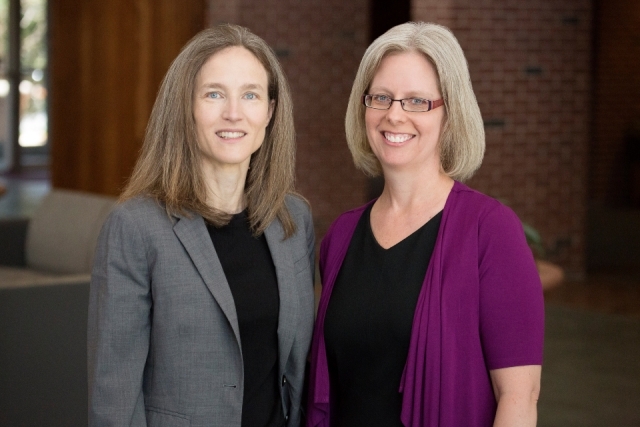
University of Illinois Law Professors Verity Winship (left) and Jennifer K. Robbennolt (right)
Verity Winship, a Professor of Law at the University of Illinois, and Jennifer K. Robbennolt, an Alice Curtis Campbell Professor of Law and Professor of Psychology at the University of Illinois, will receive the Hugh L. Carey Center for Dispute Resolution’s 2020 Mangano Dispute Resolution Advancement Award for their scholarly examination of SEC settlements reported in “An Empirical Study of Admissions in SEC Settlements.”
The $5000 annual award recognizes scholars whose published empirical research has furthered the advancement and understanding of the values and skills of dispute resolution. It was established through the generosity of Hon. Guy J. Mangano '55, '83HON, who has dedicated his long career to promoting dispute resolution, first as presiding justice of the New York State Appellate Division, Second Department, next as a state legislator, and then as an arbitrator and mediator.
This year’s Mangano Award winners bring a shared interest in dispute negotiation, expertise in empirical methods and dispute resolution, and a deep knowledge of agency negotiation and settlement to their in-depth look at SEC settlements. Their empirical study offers key insights that can inform the work of regulators, lawmakers, and other financial industry influencers going forward.
In the wake of the 2007-2008 financial crisis, there was a public outcry to hold Wall Street’s financial institutions and their operatives accountable. Accused by Main Street, the media, and judges alike of going too easy on wrongdoers, who typically settled charges without admitting or denying guilt, the Securities and Exchange Commission (SEC) revamped its enforcement policies.
One key change, announced in 2013, was that the agency would require admissions as a condition for settlement in cases where they furthered “public accountability” and “acceptance of responsibility.” The agency retained discretion in deciding if and when to ask for admissions, and most of its cases settled on the long-standard “no admit, no deny” basis. Still, after just three fiscal years, then-SEC Chair Mary Jo White proclaimed the new policy a major success that had transformed the business of financial industry regulation.
With their study, which complements earlier research they reported in “Admissions of Guilt in Civil Enforcement,” Professors Winship and Robbennolt look under the hood of that blanket claim to see how the SEC actually exercised its discretion to require admissions over seven years, from FY2011 to FY2017.
The data, they share, reveal fewer than 100 settlements containing admissions. The majority of those admissions are admissions of fact, as opposed to admissions of legal violation or scienter. They also report that half of the settling defendants were individuals, rather than entities, and that almost half of the settlements resulted in low or no monetary sanctions. Their findings undercut any claim that the SEC’s revamped admissions policy has been transformative.
Considering this year’s Mango Award nominations and submissions, the award selection committee comprised of Elayne E. Greenberg, Assistant Dean for Dispute Resolution Programs, Professor of Legal Practice, and Director of the Carey Center, and St. John’s Law Professors Keith Sharfman, Jeff Sovern, and Ettie Ward recognized Professor Winship’s and Professor Robbennolt’s empirical study of SEC settlements as reflecting their outstanding scholarship in the field.
Research considered for the Mangano award has broad applicability to the alternate dispute resolution field, or focuses on the values and application of dispute resolution in a specific area. Interdisciplinary research is encouraged, and the findings should be published in a nationally respected journal within a specified period. In assessing a candidate, the selection committee also considers:
- The significance and quality of the research
- The interdisciplinary and/or innovative nature of the work
- The extent to which the research has started to impact the field
- The researcher’s reputation and capacity to continue being an agent of change
“This article on admissions in SEC settlements exemplifies the purpose of the Mangano Award: interdisciplinary, empirical research authored by respected scholars that will impact the practice of dispute resolution,” Professor Greenberg says. “As Verity and Jennifer recognize, admissions of guilt reinforce an agency’s accountability, authority, and legitimacy. Beyond admission in agency settlements, their research has broader implications for dispute resolution practice. Settlements have become our primary mode of resolving disputes. The presence or absence of admissions implicates how we value the acknowledgment of responsibility, what we prioritize about settlement, and the quality of justice settlement offers.”
Professor Robbennolt will accept the Mangano Award on behalf of the winning scholars and will discuss their research with students and faculty at an April 20, 2020 ceremony at St. John’s Law.
Related News
St. John’s Law Students Volunteer to Close the Justice Gap for New Yorkers
On Friday afternoons, Room 116 in the Queens County Civil Courthouse becomes a bridge between classroom learning, community service, and justice in action for a dedicated group of St. John’s Law...
Law Matters: A Conversation With Professor Robin Boyle-Laisure
In this installment of our Law Matters story series, Dean Jelani Jefferson Exum speaks with Professor Robin Boyle-Laisure about her scholarship and advocacy addressing cults and human trafficking...
St. John’s University School of Law Receives Historic Gift to Name DiMartino/Smith Public Interest Center
Dean Jelani Jefferson Exum has announced that the Public Interest Center at St. John’s Law will be named the DiMartino/Smith Public Interest Center in honor of alumna Rose DiMartino ’81 and her spouse...
